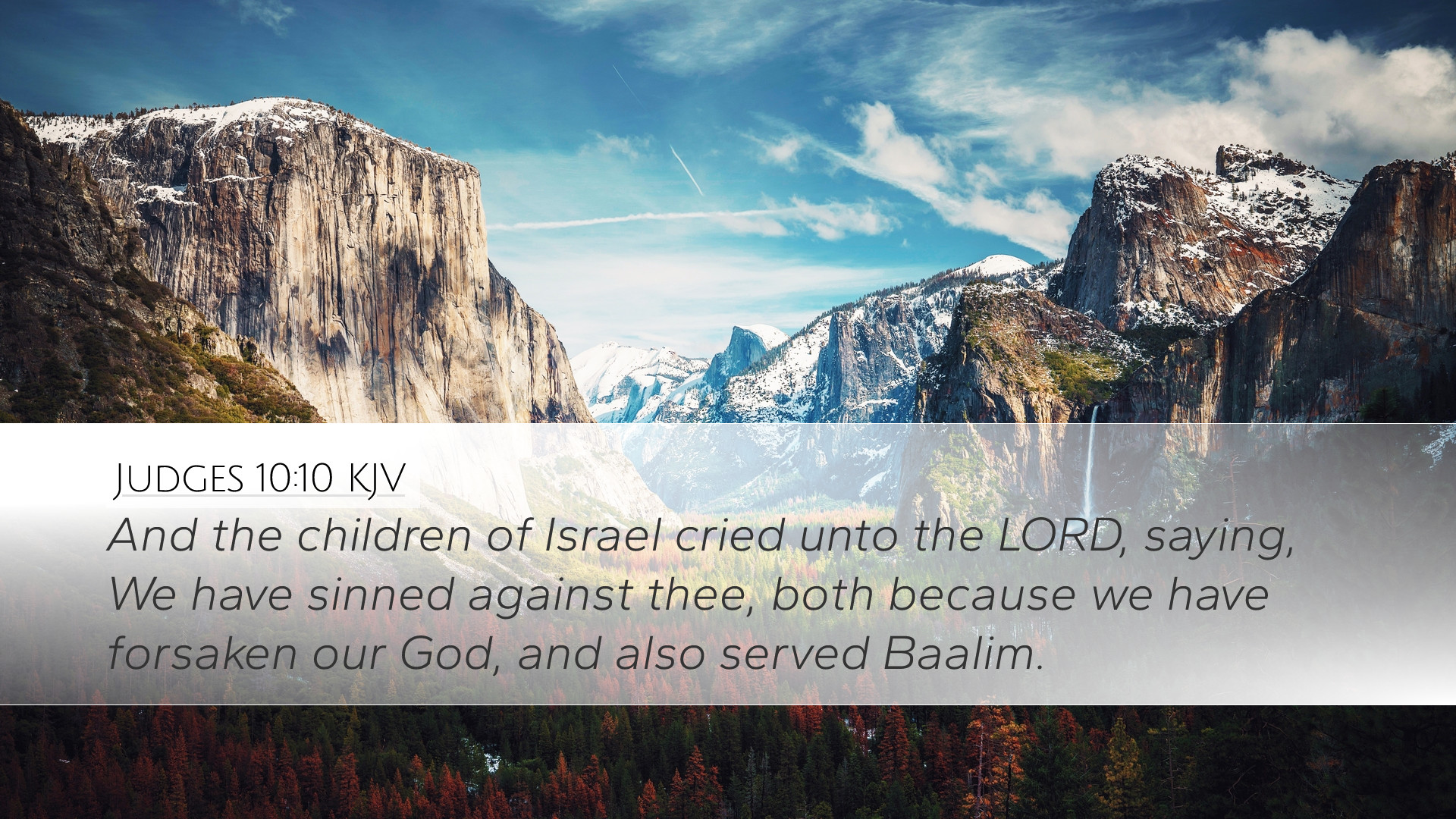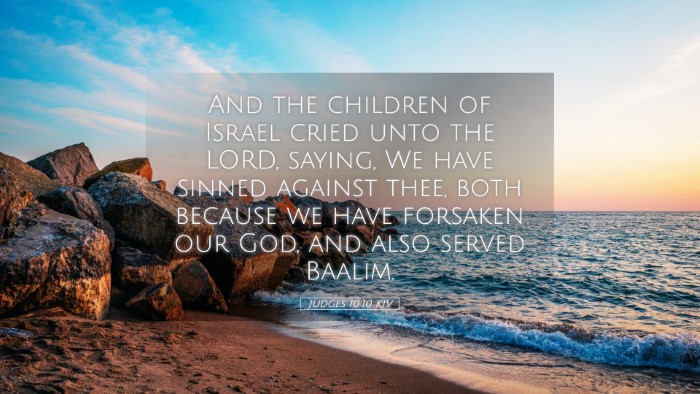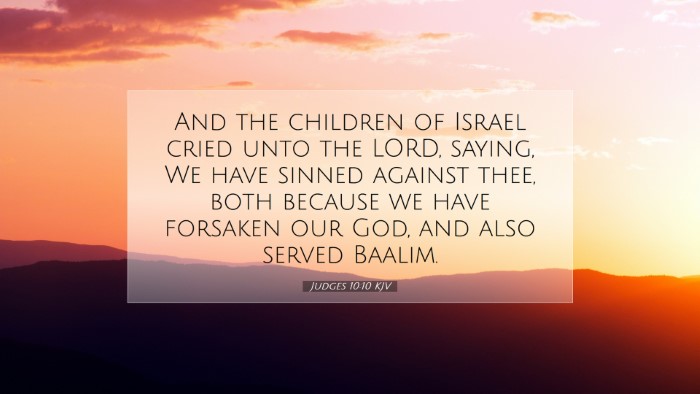Old Testament
Genesis Exodus Leviticus Numbers Deuteronomy Joshua Judges Ruth 1 Samuel 2 Samuel 1 Kings 2 Kings 1 Chronicles 2 Chronicles Ezra Nehemiah Esther Job Psalms Proverbs Ecclesiastes Song of Solomon Isaiah Jeremiah Lamentations Ezekiel Daniel Hosea Joel Amos Obadiah Jonah Micah Nahum Habakkuk Zephaniah Haggai Zechariah MalachiJudges 10:10
Judges 10:10 KJV
And the children of Israel cried unto the LORD, saying, We have sinned against thee, both because we have forsaken our God, and also served Baalim.
Judges 10:10 Bible Commentary
Commentary on Judges 10:10
Verse Context: Judges 10:10 reads: "And the children of Israel cried unto the LORD, saying, We have sinned against thee, both because we have forsaken our God, and served Baalim."
This verse reveals a crucial turning point in Israel's cyclical pattern of sin, judgment, repentance, and deliverance. It underscores the gravity of Israel's sins and their recognition of God’s sovereignty.
Overview of the Commentary
In this commentary, we explore insights from renowned public domain theologians: Matthew Henry, Albert Barnes, and Adam Clarke. Their perspectives will shed light on the significance of repentance, the nature of Israel's apostasy, and God's inability to forsake His people.
Insights from Matthew Henry
Matthew Henry emphasizes the urgency of repentance. He notes that the cry of the Israelites is a genuine acknowledgment of their failure. Henry states that their plea consisted of two parts: an admission of sin and a confession of their failure to uphold their covenant with God.
- Acknowledgment of Sin: Henry highlights that the Israelites recognized their sin of idolatry, specifically mentioning their service to Baalim. This acknowledgment is crucial for true repentance and restoration.
- God’s Patience: Henry points out the patience of God in dealing with Israel’s repeated transgressions. The children of Israel's cry serves as a reminder of how God's long-suffering nature provides opportunities for repentance.
Insights from Albert Barnes
Albert Barnes provides a detailed examination of the nature of Israel's cry and the implications of their sin. Barnes observes that their confession indicates a significant spiritual awakening.
- Recognition of Forsaking God: Barnes notes that the act of forsaking God illustrates a conscious decision and a spiritual estrangement. Their return involved a reinstatement of the covenant relationship they had with Yahweh.
- Comprehensive Repentance: Contemplating the dual confession of sin against God and between serving false idols, Barnes stresses that this verse reflects the comprehensive nature of true repentance. It’s not just about turning from sin, but turning back to God with all one's heart.
Insights from Adam Clarke
Adam Clarke elaborates on the critical role of national confession in the life of Israel. According to Clarke, the communal nature of this repentance depicts their corporate identity before God.
- Corporate Responsibility: Clarke emphasizes that the nation as a whole bore the guilt of idolatry, illustrating the collective nature of sin and repentance. This understanding challenges the modern church to consider its corporate identity under God.
- Plea for Divine Assistance: Clarke remarks that their plea not only acknowledges sin but also expresses an urgent need for divine help. This highlights the interplay between human recognition of sinfulness and reliance upon God’s mercy.
Thematic Reflection
In summary, Judges 10:10 encapsulates essential themes crucial for pastoral care, theological reflection, and personal repentance:
- The Importance of Acknowledgment: Recognizing sin is fundamental to the process of repentance. Both pastors and laypeople must affirm that acknowledging wrongdoing is a prerequisite to experiencing God's grace.
- The Role of Idolatry: Serving false gods is not merely an ancient issue but a modern reality. Understanding contemporary forms of idolatry can help congregations navigate spiritual fidelity.
- Community and Confession: Emphasizing corporate responsibility can deepen congregational identity and foster unity through shared recognition of sin and a collective return to God.
- God's Faithfulness: The faithful response of God to humble confessions should inspire confidence in His mercy, especially in times of national or communal crisis.
Conclusion
The reflection on Judges 10:10 offers profound insights for readers within a faith community. The collective cry of the Israelites serves as a reminder that no matter how far one strays, genuine repentance opens the door to restoration and renewal. It invites pastors and scholars alike to examine both personal and communal aspects of faith, ensuring that the church remains a vibrant, responsive body of believers dedicated to the one true God.


